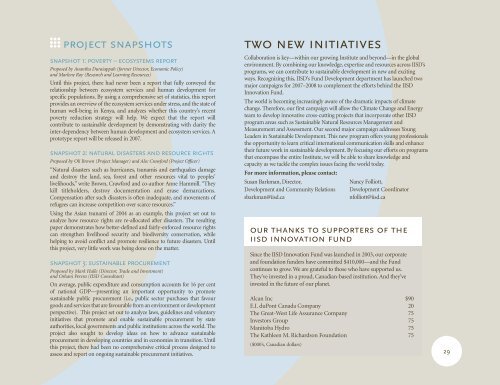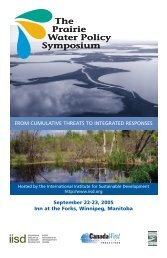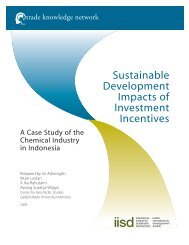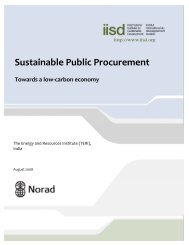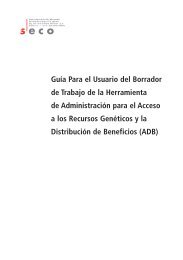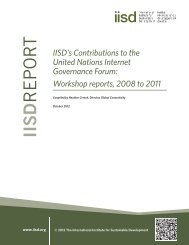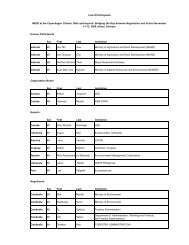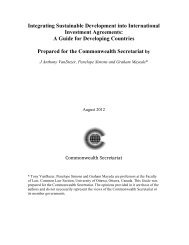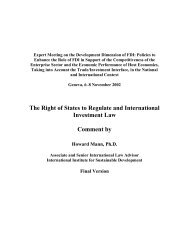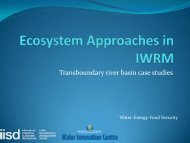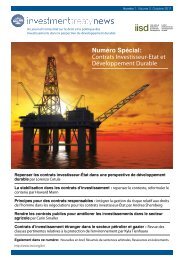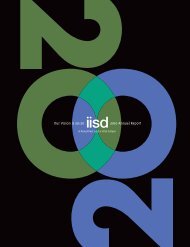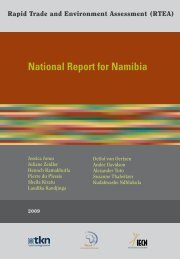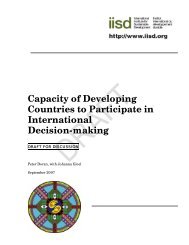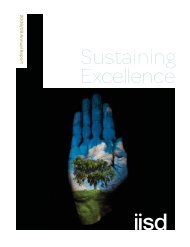2006/2007 Annual Report - International Institute for Sustainable ...
2006/2007 Annual Report - International Institute for Sustainable ...
2006/2007 Annual Report - International Institute for Sustainable ...
You also want an ePaper? Increase the reach of your titles
YUMPU automatically turns print PDFs into web optimized ePapers that Google loves.
project snapshots<br />
snapshot 1: poverty – ecosystems report<br />
Proposed by Anantha Duraiappah (<strong>for</strong>mer Director, Economic Policy)<br />
and Marlene Roy (Research and Learning Resources)<br />
Until this project, there had never been a report that fully conveyed the<br />
relationship between ecosystem services and human development <strong>for</strong><br />
specific populations. By using a comprehensive set of statistics, this report<br />
provides an overview of the ecosystem services under stress, and the state of<br />
human well-being in Kenya, and analyzes whether this country’s recent<br />
poverty reduction strategy will help. We expect that the report will<br />
contribute to sustainable development by demonstrating with clarity the<br />
inter-dependency between human development and ecosystem services. A<br />
prototype report will be released in <strong>2007</strong>.<br />
snapshot 2: natural disasters and resource rights<br />
Proposed by Oli Brown (Project Manager) and Alec Craw<strong>for</strong>d (Project Officer)<br />
“Natural disasters such as hurricanes, tsunamis and earthquakes damage<br />
and destroy the land, sea, <strong>for</strong>est and other resources vital to peoples’<br />
livelihoods,” write Brown, Craw<strong>for</strong>d and co-author Anne Hammill. “They<br />
kill titleholders, destroy documentation and erase demarcations.<br />
Compensation after such disasters is often inadequate, and movements of<br />
refugees can increase competition over scarce resources.”<br />
Using the Asian tsunami of 2004 as an example, this project set out to<br />
analyze how resource rights are re-allocated after disasters. The resulting<br />
paper demonstrates how better-defined and fairly-en<strong>for</strong>ced resource rights<br />
can strengthen livelihood security and biodiversity conservation, while<br />
helping to avoid conflict and promote resilience to future disasters. Until<br />
this project, very little work was being done on the matter.<br />
snapshot 3: sustainable procurement<br />
Proposed by Mark Halle (Director, Trade and Investment)<br />
and Oshani Perera (IISD Consultant)<br />
On average, public expenditure and consumption accounts <strong>for</strong> 16 per cent<br />
of national GDP—presenting an important opportunity to promote<br />
sustainable public procurement (i.e., public sector purchases that favour<br />
goods and services that are favourable from an environment or development<br />
perspective). This project set out to analyze laws, guidelines and voluntary<br />
initiatives that promote and enable sustainable procurement by state<br />
authorities, local governments and public institutions across the world. The<br />
project also sought to develop ideas on how to advance sustainable<br />
procurement in developing countries and in economies in transition. Until<br />
this project, there had been no comprehensive critical process designed to<br />
assess and report on ongoing sustainable procurement initiatives.<br />
two new initiatives<br />
Collaboration is key—within our growing <strong>Institute</strong> and beyond—in the global<br />
environment. By combining our knowledge, expertise and resources across IISD’s<br />
programs, we can contribute to sustainable development in new and exciting<br />
ways. Recognizing this, IISD’s Fund Development department has launched two<br />
major campaigns <strong>for</strong> <strong>2007</strong>–2008 to complement the ef<strong>for</strong>ts behind the IISD<br />
Innovation Fund.<br />
The world is becoming increasingly aware of the dramatic impacts of climate<br />
change. There<strong>for</strong>e, our first campaign will allow the Climate Change and Energy<br />
team to develop innovative cross-cutting projects that incorporate other IISD<br />
program areas such as <strong>Sustainable</strong> Natural Resources Management and<br />
Measurement and Assessment. Our second major campaign addresses Young<br />
Leaders in <strong>Sustainable</strong> Development. This new program offers young professionals<br />
the opportunity to learn critical international communication skills and enhance<br />
their future work in sustainable development. By focusing our ef<strong>for</strong>ts on programs<br />
that encompass the entire <strong>Institute</strong>, we will be able to share knowledge and<br />
capacity as we tackle the complex issues facing the world today.<br />
For more in<strong>for</strong>mation, please contact:<br />
Susan Barkman, Director,<br />
Development and Community Relations<br />
sbarkman@iisd.ca<br />
Nancy Folliott,<br />
Development Coordinator<br />
nfolliott@iisd.ca<br />
our thanks to supporters of the<br />
iisd innovation fund<br />
Since the IISD Innovation Fund was launched in 2003, our corporate<br />
and foundation funders have committed $410,000—and the Fund<br />
continues to grow. We are grateful to those who have supported us.<br />
They've invested in a proud, Canadian-based institution. And they've<br />
invested in the future of our planet.<br />
Alcan Inc $90<br />
E.I. duPont Canada Company 20<br />
The Great-West Life Assurance Company 75<br />
Investors Group 75<br />
Manitoba Hydro 75<br />
The Kathleen M. Richardson Foundation 75<br />
($000’s, Canadian dollars)<br />
29


